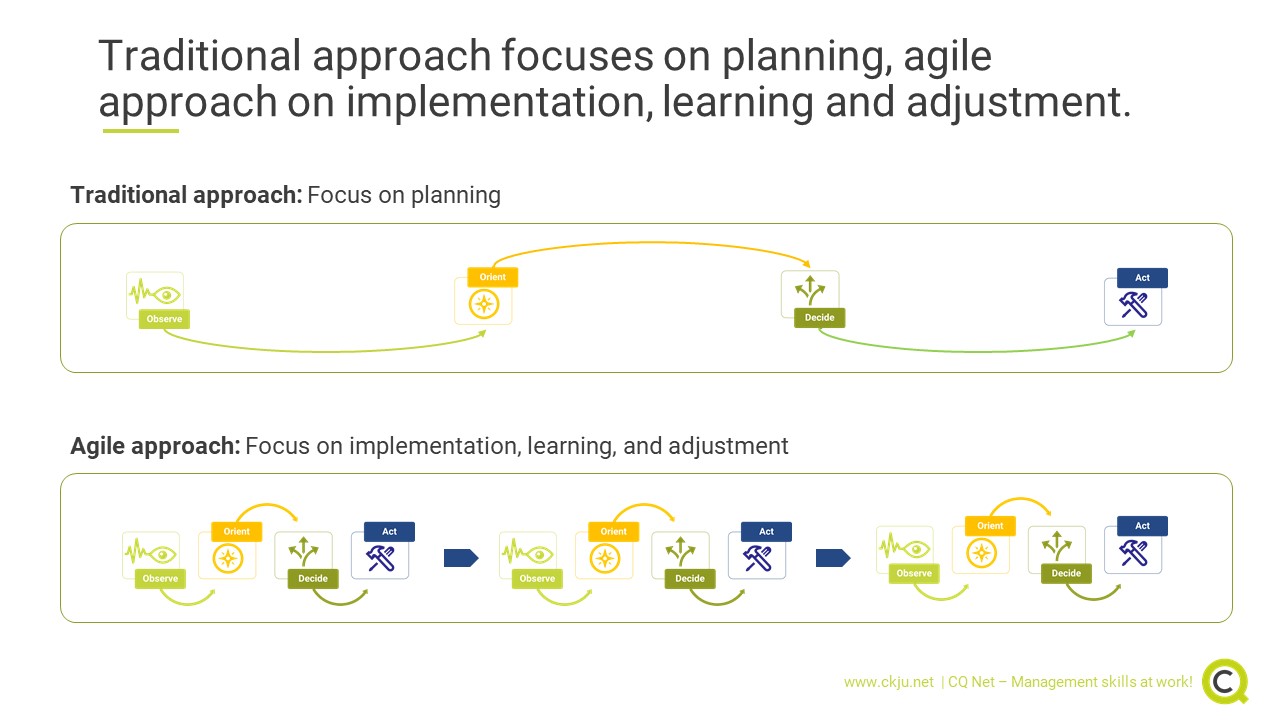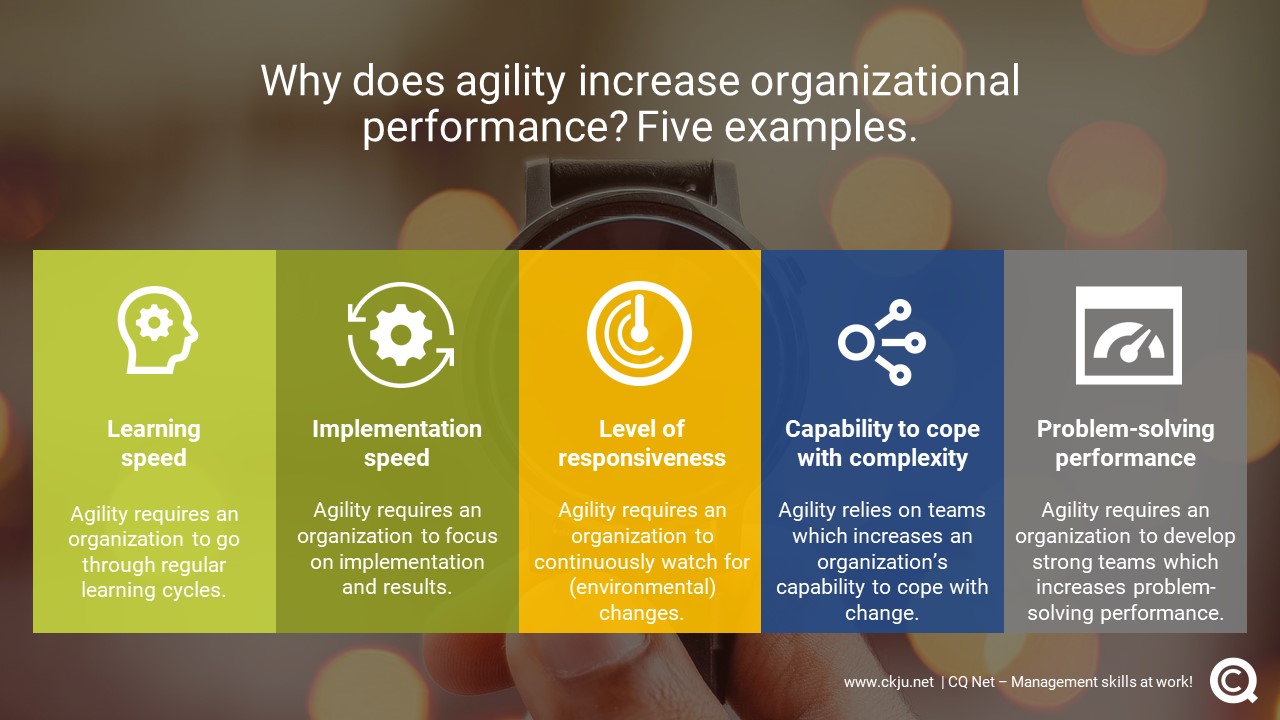- Blog
- Why agility matters
Contents
- (Organizational) agility is a management megatrend
- A higher level of agility translates into a competitive advantage
- The core of agility: Cycles of structured decision-making and decision-implementation
- Why does agility increase organizational performance?
- Agility is more than a management fad
- References and further reading
When implemented in the right way organizational agility matters and can significantly increase organizational performance.Dr. Markus Nini
(Organizational) agility is a management megatrend
From a management perspective, (organizational) agility has become one of the megatrends in the last couple of years. Phrases such as “we need to get more agile” or “agility is key to succeed in a VUCA environment” have become part of the standard vocabulary of almost any professional and executive.
Taking this into consideration, inevitably the questions arises whether agility as a management tools is of real value or another management fad. We argue that when implemented in the right way organizational agility matters and can significantly increase organizational performance.
A higher level of agility translates into a competitive advantage
In its core agility is a decision-making and decision implementation framework. It is based on the assumption that individuals, teams and organizations which are capable of making decision faster, of higher quality and implement them in a timelier manner reach a higher performance level than their less agile peers.
Over the long run, a higher level of agility translates into a competitive advantage. Organizations higher in agility simply outmaneuver their less agile counterparts. This especially applies to organizations exposed to an environment characterized by a high level of volatility, complexity, uncertainty and ambiguity also referred to as VUCA (Friedman, 2020).
The core of agility: Cycles of structured decision-making and decision-implementation
In a VUCA world things are in a constant flux. Actions you defined yesterday could already be outdated today. Agility takes this into account and requires you to go through cycles of structured decision-making and decision-implementation. Popular agile frameworks such as SCRUM refer to those agile cycles as sprints.
Every time you go through such a cycle you are forced to reflect whether things move into the right direction or not. Either way, agility forces you to act by confirming the change direction or by choosing another intervention to re-adjust based on what you learned in the most recent cycle.
This build-in decision-making, decision-implementation and result reflection logic forces your organization to continuously adapt and learn (Winby and Worley, 2014). It is also the main mechanism that drives organizational performance as we will see next.
Why does agility increase organizational performance?
Agility does not increase organizational performance just because it is a management megatrend. To better understand the agility – organizational performance relationship we need to look at some of the determinants of organizational performance itself.
- Learning speed
- Implementation speed
- Level of responsiveness
- Capability to cope with complexity
- Problem-solving performance
Agility increases learning speed
Learning speed is one of the key determinants of individual and organizational performance. Every agile cycle requires you to go through the three stages
- decision-making,
- decision-implementation
- and result reflection.
The third step result reflection requires you to evaluate and learn about whether your actions had the desired effect or not. In addition, it also forces you to recognize potential environmental changes that could have an impact on what you want to achieve.
Assumed your cycle time is one week, you will go through the result-reflection stage once a week. This will tremendously speed-up learning and thus organizational performance.
Agility increases implementation speed
Getting things done requires you to change something in the physical world. The same way agility increase learning speed does it increase implementation speed.
Furthermore, the combination of learning and implementation drives efficiency and effectivity. Every time you go through the result reflection phase you will learn how to adjust your implementation efforts in order to achieve the desired outcome.
Agility increases the level of responsiveness
Whether an organization recognizes potential risks and chances early can have an immediate impact on its performance. Agility requires you to watch for relevant developments within the organization or in its environment on a regular basis (Worley and LAWLER, 2010).
The pace of this monitoring process determines the level of responsiveness of your organization to a considerable extend. With a weekly cycle time, you will recognize potential risks and chances early enough the define countermeasures or utilize the opportunity in the most beneficial way possible.
Agility increases the capability to cope with complexity
Agility is a management tool that extends from the individual level to the team and organizational level. It requires the right mindset, processes and structural elements on all three levels. For organization that have to deal with a high level of complexity, team level agility is of particular importance.
Agile teams go through the three stages decision-making, decision implementation and result reflection on their own. This team-level agile cycle enables teams to increase their capability to cope with complexity (Keister, 2014). Whenever possible agile teams cope with complexity in a decentralized manner at the time and at the place complexity emerges.
This makes agile teams an important building block of organizational agility. Complexity that was dealt with on team level has not to be conveyed to an organizational level. Consequently, the capability to cope with complexity increases on organizational level as well.
Agility increases problem-solving performance
On a more detailed level, coping with complexity goes hand in hand with problem-solving performance. Agile teams need to be strong in problem-solving in order to cope with complexity.
You can increase your team’s problem-solving performance by choosing the right team members, improving team dynamics and your team’s mental models.
Agility is more than a management fad
Agility is more than a management fad. When implemented in the right way it can have a measurable positive impact on organizational performance (Joiner, 2019). However, organizational agility cannot be switched on or off. It can also not be achieved by just implementing one of the agile product development frameworks like SCRUM or Kanban.
You are interested in learning more about agility and how it can be implemented? Check out our CQ Dossiers, products and service related to agility or book a management counseling session with one of our experts.
References and further reading
Friedman, H. H. (2020) ‘Organizational Agility, Visionary Leadership in the Age of VUCA’, SSRN Electronic Journal.
Joiner, B. (2019) ‘Leadership Agility for Organizational Agility’, Journal of Creating Value, vol. 5, no. 2, pp. 139–149.
Keister, A. C. C. (2014) ‘Thriving Teams and Change Agility: Leveraging a Collective State to Create Organization Agility’, in Shani, A. B. and Noumair, D. A. (eds) Research in Organizational Change and Development, Emerald Group Publishing Limited, pp. 299–333.
Winby, S. and Worley, C. G. (2014) ‘Management processes for agility, speed, and innovation’, Organizational Dynamics, vol. 43, no. 3, pp. 225–234.
Worley, C. G. and LAWLER, E. E. (2010) ‘Agility and Organization Design’, Organizational Dynamics, vol. 39, no. 2, pp. 194–204.
Top Rated
About the Author

Comments
Most Read Articles
Blog Categories
RELATED SERVICES











Add comment